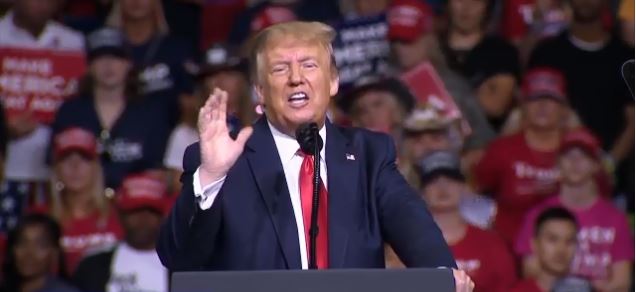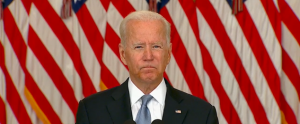
National Review: The Senate on Saturday voted 57-43 to acquit former President Donald Trump for “incitement of an insurrection” after the House last month passed a single article of impeachment against him for his role in encouraging his supporters to amass at the U.S. Capitol on January 6.
Seven GOP senators joined Democrats in voting to convict the former president: Senators Richard Burr of North Carolina, Bill Cassidy of Louisiana, Susan Collins of Maine, Lisa Murkowski of Alaska, Mitt Romney of Utah, Ben Sasse of Nebraska and Pat Toomey of Pennsylvania.
At least 17 Republican votes were needed to convict.
Ahead of the vote, Senate minority leader Mitch McConnell had reportedly suggested to his Republican colleagues that voting to convict or acquit Trump would be a matter of conscience and would not need to align with senators’ earlier votes to dispute the constitutionality of the trial.
While McConnell declined to whip votes either for or against impeachment, he ultimately voted to acquit on the grounds that the Senate lacked the authority to convict a private citizen. He did, however, condemn Trump in a speech on the Senate floor after the vote.
“The people who stormed this building believed they were acting on the wishes and instructions of their president. And having that belief was a foreseeable consequence of the growing crescendo of false statements, conspiracy theories, and reckless hyperbole which the defeated president kept shamefully shouting into the largest megaphone on earth,” McConnell said.
“The leader of the free world cannot spend weeks thundering that shadowy forces are stealing our country and then feign surprise when people believe him and do reckless things,” he added.
The acquittal, which comes as little surprise after just six GOP senators on Tuesday voted to support the constitutionality of the trial, marks the end of the former president’s short, five-day trial proceedings.
The Democrats presented their case over two days, attempting to pin the pro-Trump rioters’ actions on the 45th president, arguing that his rhetoric in the hours before — and in the months leading up to — the electoral-vote count on January 6 stirred up supporters and led them to storm the Capitol. The unrest left five people dead, including one Capitol Hill police officer.
Meanwhile, the defense rested their case on Friday after using less than three of the 16 hours they were allotted for arguments.
Trump’s attorneys argued that the impeachment charge was purely political and that the former president’s rhetoric was protected by the First Amendment.
Trump’s attorney Michael van der Veen argued that the former president’s comments on January 6 were “ordinary political rhetoric” that is “virtually indistinguishable from the language that has been used by people across the political spectrum for hundreds of years.”
At a rally outside the White House the morning of January 6, Trump told supporters, “If you don’t fight like hell you’re not going to have a country anymore.”
The defense suggested there is a double standard between the parties in terms of what rhetoric is deemed acceptable, and played a long video montage of Democrats saying the word “fight” in a number of contexts.
Trump’s lawyers also claimed it would set a dangerous precedent to impeach a former official, with Van der Veen saying impeachment could “happen to a lot of people” if the Senate convicted the former president. However, Trump was impeached by the House while he was still in office.
The House impeachment managers had accused Trump of “the most grievous constitutional crime ever committed by a President” in a brief filed on Monday in response to the Trump team’s answer to the article of impeachment.
The Democrats claimed Trump’s repeated assertions that the election had been rigged, including during his rally on January 6, had encouraged his supporters to storm the Capitol as Congress met to certify President Biden’s Electoral College victory.
“He had assembled thousands of violent people, people he knew were capable of violence, people he had seen be violent,” House manager Madeleine Dean said in the trial. “And then he pointed to us, lit the fuse and sent an angry mob to fight the perceived enemy — his own vice president and members of Congress — as we certified an election.”
Democrats’ presentation included never-before-seen video and audio evidence of the chaos at the Capitol, including security footage inside the building that showed lawmakers running to safety.
House impeachment managers also scrutinized Trump’s social media posts during and after the rioting, saying he had not done enough to deescalate the situation.
The Senate and trial lawyers reached an agreement Saturday to admit a written statement from Representative Jaime Herrera Beutler (R., Wash.) into the trial record, after the chamber initially voted 55-45 earlier in the day to allow witnesses to be called.
The surprise vote to call witnesses threatened to throw the trial into uncertainty at the last moment, extending it by days or even weeks. The Senate avoided a lengthier trial by using a statement Herrera Beutler released on Friday as evidence instead.
In her statement, Herrera Beutler describes a conversation she had with House minority leader Kevin McCarthy in which the GOP Leader told her Trump had sided with the mob when the pair spoke on January 6.
Herrera Beutler, one of ten House Republicans to vote to impeach Trump last month, confirmed reports that McCarthy had reached Trump by phone on January 6.
The Washington Republican said McCarthy told her that when he spoke to Trump that day and asked him to “publicly and forcefully” call off the Capitol assault, “the president initially repeated the falsehood that it was antifa that had breached the Capitol.”
“McCarthy refuted that and told the president that these were Trump supporters,” Beutler’s statement said. “That’s when, according to McCarthy, the president said: ‘Well, Kevin, I guess these people are more upset about the election than you are.’”
Additionally, Senator Tommy Tuberville (R., Ala.) told reporters he had a phone call with Trump on 2:15 p.m. on January 6, during which the senator told the president that Vice President Mike Pence had been evacuated. Still, after the call, Trump criticized Pence in a tweet.
When Senator Bill Cassidy (R., La.) asked the defense about the call, Van der Veen called Tuberville’s comments “hearsay” and accused the House of conducting rushed impeachment proceedings.
“I have no idea and nobody from the House has given us any opportunity to have any other idea,” he said.
Cassidy later told reporters that he “didn’t think it was a very good answer.”




